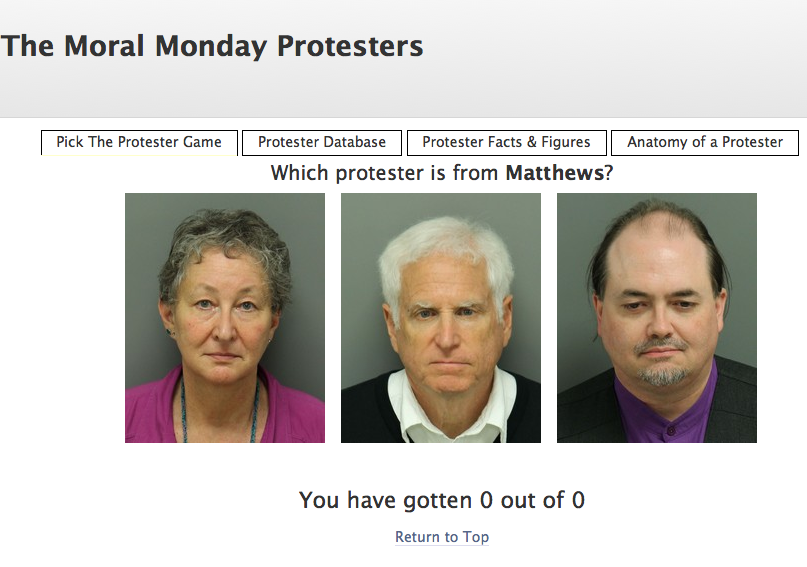Art Pope-funded group launches database targeting Moral Monday arrestees

The John W. Pope Civitas Institute, a conservative think tank based in Raleigh, N.C., has launched a database targeting people who've been arrested as part of the Moral Monday nonviolent protests at the state legislature.
The Civitas Institute was founded by conservative mega-donor and discount-retail mogul Art Pope, now the North Carolina budget director under Republican Gov. Pat McCrory, and it was named for Pope's father. The nonprofit gets about 94 percent of its funding from the family foundation Pope chairs. That raises questions about the ethics of a public official who's been a target of the protests being involved in an apparent effort to target the protesters for harassment -- or worse.
"This is troubling from a group whose supporters include far right extremists in favor of loose regulation of gun ownership, among other things," Progress North Carolina, a liberal advocacy group, said in post on its Facebook page.
The Civitas database includes each protester's name, city and county of residence, sex, race, age, arrest date, occupation, employer (and whether it's in the public, private or nonprofit sector), interest group affiliations, and mugshot.
It also includes arrestees' voter registration information and whether there was a discrepancy between the address the person is registered at and the address they gave when arrested. A number of those discrepancies appear to involve students, who often register to vote at their parents' home while living elsewhere to attend school. Discrepancies can also occur when someone has moved since the last election but hasn't updated his or her registration.
The database offers infographics detailing demographic and political characteristics of those arrested. And it offers a "Pick the Protester Game" in which visitors to the database are shown three mugshots and asked a question about them, such as "Which protester is 55 years old?" or "Which protester is from Orange County?"
Civitas says the project aims to shine a light on the growing protest movement. "Recent media reports have suggested that the protesters disrupting the General Assembly at 'Moral Mondays' represent a cross-section of North Carolina citizens," according to a statement on its website. "We decided to investigate that claim. Using arrest records and other public documents, we investigated who really is involved in these protests -- the results may surprise you."
Nearly 500 people have been arrested since the ongoing protests, organized by the North Carolina chapter of the NAACP, began in late April. Those arrested have faced misdemeanor charges including trespassing and failure to disperse after gathering inside the legislature, singing and holding signs, and disobeying police orders to leave. Among those arrested was Chris Kromm, executive director of the Institute for Southern Studies, the nonprofit publisher of Facing South.
The protests oppose the legislature's far-right agenda, which has included rejecting federal funds to expand health care for the poor, curtailing voting rights, cutting unemployment benefits, and restarting the death penalty.
North Carolina's current legislature is controlled by a Republican supermajority that was elected with generous funding from Pope and his immediate family, and from outside spending groups supported by Pope and his business, the North Carolina-based Variety Wholesalers discount retail chain. The supermajority was also enabled by a controversial redistricting process that favored Republicans and packed minorities into majority-minority districts while diluting their power elsewhere, and to which Pope served as an advisor.
Republican leaders' response to the Moral Monday protests has at times evoked a painful chapter of Southern history. Speaking earlier this month to the state Republican Party convention in Charlotte, Gov. McCrory said the protests were the work of "outsiders" -- even though Civitas' own database shows that those arrested are overwhelmingly North Carolina residents. McCrory's remark calls to mind how former Alabama Gov. George Wallace, an ardent segregationist, blamed civil rights demonstrations in his state on the work of "outside agitators."
Civitas' database brings to mind another troubling episode of mid-20th century U.S. history: how in some Southern cities at that time the white-supremacist White Citizens' Councils (WCC) would publish in local newspapers the names of NAACP supporters and those who signed anti-segregation petitions in order to encourage retaliation against them. The WCCs, like Civitas, also had close ties to powerful government officials.
* * *
UPDATE: The Civitas database got the attention of the Indy Week, an alternative newspaper based in Durham, N.C. The day after the conservative group's project came to light, the Indy ran a story titled "Who's who at Civitas? Let's name names." Noting that "turnabout is fair play," editor Lisa Sorg compiled a comparable list of people on staff and on the board of the Civitas Institute and its 501(c)(4) sister organization, Civitas Action, along with their age, residence, party affilation, and other publicly available details.
Interestingly, while Sorg was assembling her list in the morning, all the staff names were listed on the Civitas Institute's website. But by that afternoon, the only one still listed was Civitas President Francis X. De Luca. But as Sorg points out, that's nothing that the Wayback Machine can't fix.
Tags
Sue Sturgis
Sue is the former editorial director of Facing South and the Institute for Southern Studies.
